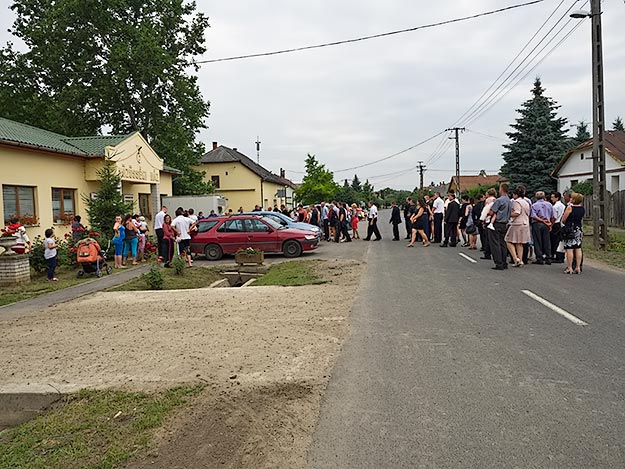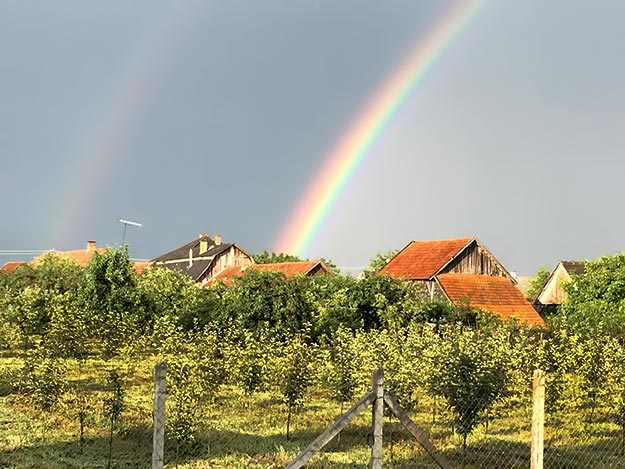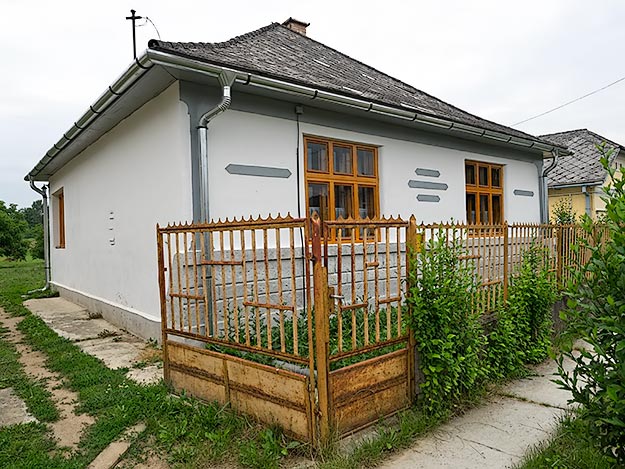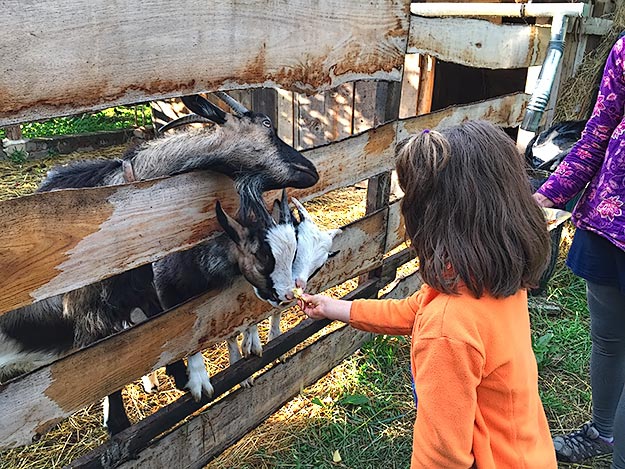My friend, Ambrus, pointed out the black flag hanging just outside the church door. Someone has died in Panyola. Later, I mentioned this to his wife, Zsuzsa. “Yes, I know, they rang the bells,” she said. Curious, I asked if the bells had been rung once for each year of age of the deceased, as they used to do in some smaller parishes in England. “No, here the bells tell us if it was a man, woman, or child.”
This tiny village in Hungary’s far eastern Szatmar County has changed little since I last visited, nearly two years ago. It’s half-dozen streets are home to about 500 people, and aside from a small grocery store the only other commercial enterprise is the Panyolai Palinka Distillery, which produces some of the country’s finest fruit brandies from the Nemtudom (“I don’t know”) plums that grow only in this part of Hungary. The trees are heavy laden this year. “Even trees that have never produced are full,” Ambrus says. No one knows why. It is not related to rainfall or cold or heat; it’s just the natural cycle of things.

This is good news for the new owners of the distillery, who recently purchased it from the three local men who brought it back to life after it was abandoned following the collapse of the Soviet Union. According to Zsuzsa, the three men had a vision but lacked the necessary management skills. Sadly, the plant is not a source of employment for the town, as the new owner has brought in outside workers, with the exception of the brewmaster.
Unemployment and under-employment are the most pressing issues facing the small rural communities of Eastern Hungary. On the day I joined Ambrus for his weekly shopping trip to Beregove, in neighboring Ukraine, we passed village after sleepy village where simple masonry houses with wooden gables and ceramic tiled roofs lined the streets. When we passed an airport with an overgrown grass landing strip, Ambrus commented that the only plane he has ever seen here was a military fighter on a training exercise, and it crashed during an attempted landing. I wondered aloud what all these people do for a living.
“That’s a good question,” he said. “Before the European Union, everyone had a cow in their backyard, which they milked twice a day, retaining a small portion for personal use and for making cottage cheese and sour cream. The rest was taken to a central collection point, where the local residents were immediately paid for their milk. A couple of times each year, a truck would arrive from Ukraine to buy hogs from the residents, and once a year, trucks would arrive from Italy to purchase the cows that were no longer producing. But since the formation of the EU, all that has disappeared.” Enterprises like the milk collection site and the processing plant were forced to close their doors, as they could not afford to retrofit or reequip to meet more stringent EU regulations. As a result, residents must now buy all their milk products at the grocery store.

These days, most residents of small Hungarian villages work for the local government. In a system that echoes feudalism, residents pay taxes to the federal government, which sends money back to the villages with a mandate to create jobs for residents. Local elected officials assign residents to trim trees, work in local museums, clean and maintain government buildings, and even sweep the streets. “Most days, you can see people sitting by the side of the street, waiting for their shifts to end so they can go home,” said Ambrus. But since nearly every family has someone employed by the government, no one is willing to speak out against the rampant corruption that exists in Hungary, for fear of losing their job.
Prior to World War II, Hungarian rural residents were stratified into three classes. The poorest owned the parcel of land upon which their home sat as well as a small garden plot which provided some of their food needs. To buy other food and necessities such a firewood, they hired out to the upper class landowners who controlled more land than they could plant and harvest themselves. Between these two were the middle class landowners, who had modest size landholdings that were planted and harvested by immediate family members, making them almost entirely self-sufficient. After WWII, Russia took control of the Eastern Bloc countries, nationalized the farmland, and created cooperatives. Residents were forced to work in these cooperatives, sometimes on the very land they used to own, with all profits going to the State. When the Soviet Union fell in 1989, residents were offered the opportunity to buy back their land, but most were too poor to do so. Much of the land was snapped up by ex-Communist officials, the only ones who had prospered enough during Communist times to afford property.

Yet, there is some hope. A trickle of people have started to return to the villages. Perhaps, like me, they sense something special in Szatmar County. This place, with its endless plains and meandering rivers, soothes my soul. Each morning I throw open the front door to my two-bedroom house, inclusive of washer and fireplace, which I have rented for $10 per night. I carry my bowl of fresh fruit and yogurt to the backyard table and read a book for a leisurely half-hour. Chickens cluck in the adjacent yard and songbirds serenade me from their tree perches. Most days, temperatures hover in the 70’s and puffy clouds scud through a brilliant blue sky. There is no TV to distract me; instead I hook up my portable stereo and play soothing music to stimulate my creative process. Afternoons are spent biking around the area; evenings are for visiting friends and whipping up impromptu dinners. I am at peace.
Zsuzsa and Ambrus feel much the same; both were professors at a University in Budapest before moving to Panyola. “I had a good job with a nice office that faced the Parliament Building in Budapest,” explained Zsuzsa. “But the money I earned all went to pay for private club memberships so my kids could have safe recreational activities in the city.” In Panyola, children roam safely and Zsuzsa insists that not only is the quality of education better than in Budapest, the schools are more personally involved with the students and parents. “At one point, we asked the kids if they wanted to move back to Budapest. My youngest stood up and left the room. My oldest boy declared, ‘I want to finish school here, get a job, live here all my life, and be buried in the corner cemetery.’”

Others have followed. Zsolti and Gaby, a young couple that owns a PR firm in Budapest, just purchased a house in an adjacent village. Another young couple with two children recently bought a second home and now split their time between Panyola and a northern suburb of Budapest. This youthful new energy has been a boon to the village. Zsuzsa is working to attract tourism and Ambrus is a partner in a cooperative that manufactures products from local produce, including dried apple rings, marmalades, and apple spread. With the help of the forward-thinking mayor, a festival celebrating the annual harvest of the Nemtudom plum is beginning to draw tourists from all over the country each fall.
But there is still much to do, and the ever increasing rules and regulations of the EU are, at the very least, impeding progress. Has the grand experiment known as the European Union failed? The more difficult it becomes to create new businesses, the less likely that new life can be breathed into poor villages like Panyola. More than 25 of the town’s elderly residents passed away last year, and only two babies were born. I can only hope that new residents begin to outnumber the times a black flag is flown at the church. I could not bear it if this Shangri-la became a ghost town.

Yes, the EU has failed! I am from that part of Slovakia which is still inhabited by major Hungarians. Before we joined the EU, there were 6 factories in my hometown (beer, tin/can, milk, meat, sugar and tobacco). The past 15 years 5 of them have been closed… and they built shops and shopping centers near or above them (after the demolition). German, Austrian and British shops. So the EU destroyed the factories, the only ways that we could create our own products and produce income, and the EU forced and forces us to buy things in German, Austrian and British shops, and produce their income. We became the slaves of the Western EU countries. We work hard to get that 400-600 € salary, while the people of Western EU countries work less to get the 800-2000 € salary.
I am so sad to hear this, Daily Magyar. Perhaps what is happening with the Euro Zone right now will cause some soul searching by those who created it, but I sincerely doubt it.
This is a very interesting article.
We moved to a similar village of 350 people in Tolna County two years ago. The village was shrinking in population.
We decided to open a small camp site and within a year are now expanding to a larger site in order to attract tourism to, what is, still a very rural part of Hungary. In our eight months we had over 100 people from 15 different countries visit our little village, contributing to the village pub and shop, as well as getting to integrate with the locals. We do not want a huge camp site . All we want to do is bring in tourism to this beautiful, often over-looked part of Hungary. Albeit that we are only 45 kms South of Lake Balaton, not people know of our small village. However, there is a lot to offer tourists who don’t want the crowds and by coming here they get to see and appreciate the real Hungary. We are very happy here and have always been made to feel welcome. As part of our expansion plans we are hoping to employ one or two people from the village. Hopefully, as more people come here, one or two will fall in love with the area and buy up some of the empty properties. Some are already coming, and there are new babies now being born this year. Eventually, perhaps, the population will increase again, and although the main industry may not be agriculture any more, tourism will take over and help with this growth.
Hi Andrew. Thanks so much for sharing your story. I hope that what you are doing reaps great benefits for your town. I love eastern Hungary!
The EU was only ever interested in big business, variations on your story can be found all over the place. I would say it’s less of a failure and more of what was intended all along. Nice to read a piece that puts the human face onto policy matters.
Thanks Graham. I wholeheartedly agree with your assessment. Corporations are controlling the world, and it’s only going to get worse.
Please tell us how you found this village and met these people. You are quite adventurous.
Hi Libbie: That’s an interesting story. I was working with Hungary Tourism, and they were assisting me in Budapest. They told me that Debrecen Tourism was looking to work with travel writers as well. Debrecen is in eastern Hungary, and I’d never been there, so I contacted them and arranged to visit there as well. Of course, I was talking about all this on my Facebook Page, so I soon had a message from Zsuzsa, who had been helping the little town of Panyola after relocating there a few years ago. She invited me to come to Panyola, and offered to put me up in one of the local guest houses and have another local woman prepare all my dinners, while she would take me around to see the sights in the region. The folks at Debrecen Tourism confirmed that they knew her, had worked with her, and that she was real, so I agreed. I meet a lot of people in my travels, and some become lifelong friends. Zsuzsa and Ambrus fall into that category, so this time around I went back just to visit them.